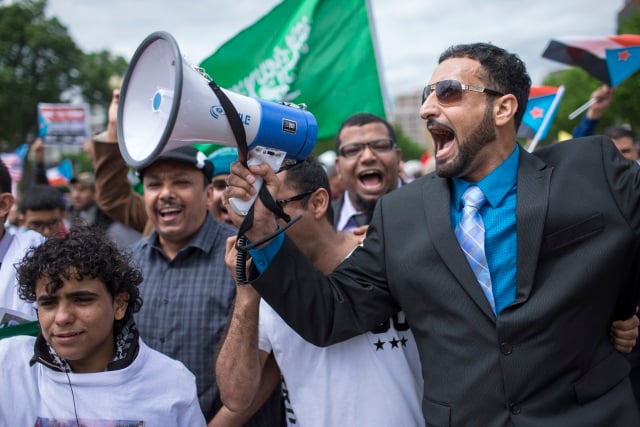‘With 60 percent of the population below the age of 30, the Arab world is characterized by its vast youth population.’ A comprehensive poll of the trends among young Arabs in the Middle East also shows that a majority reject ISIS.
A comprehensive poll of the trends among young Arabs in the Middle East, the eighth annual ASDA’A Burson-Marsteller Arab Youth Survey, shows that they overwhelmingly reject the Islamic State (ISIS) group and believe the group will fail to establish an Islamic caliphate, while they are split over whether the US is an ally or enemy.
The survey, conducted among 3,500 participants and meant to explore attitudes among men and women aged 18-24 in 16 countries in the Middle East and North Africa, found that a quarter of young people believe that the lack of jobs and opportunities is perceived as the number-one recruitment driver for ISIS, and the rise of ISIS remains the single biggest challenge facing the Middle East.
While three in four Arab youth are concerned about the rise of ISIS, just one in six believes the terrorist group ultimately will succeed. Though concern is rising – with 50 percent of youth citing it as the biggest obstacle in the region, up from 37 percent last year – tacit support for the group is declining with just 13 percent agreeing they could see themselves supporting ISIS even if it did not use so much violence, compared with 19 percent in 2015
Sunni or Shia?
The survey found that Saudi Arabia and the United Arab Emirates (UAE) are considered top allies in the region, but Iran’s influence is on the rise as well.
Iran’s increasing regional influence is reflected in the survey, with 13 percent of young Arabs now viewing the country as their biggest ally – although a small majority of young Arabs (52 percent) view it as an enemy.
Young Arabs believe Sunni-Shia relations are deteriorating and that religion plays too big of a role in the Middle East
Nearly half (47 percent) of young Arabs believe that relations between the two sects have worsened in the last five years. More than half of young Arabs (52 percent) agree that religion plays too big of a role in the Middle East – a notion that extends across the Arab world according to the survey.
Views on the US are increasingly polarised. While two-thirds of young Arabs view the country as an ally, one third see the country as an enemy, especially in Iraq (93 percent) and Yemen (82 percent).
It is of significance to note that 81 percent of young people in the the Palestinian Authority view the US as an enemy.
Yearning for Stability Over Democracy
As for the Arab Spring, years of fighting for political freedom has left most young Arabs yearning for stability over democracy.
Five years after the Arab Spring, most young Arabs today are prioritizing stability over democracy. In 2016, just 36 percent of young Arabs think that the Arab world is better off following the uprisings, down from 72 percent in 2012 at the height of unrest. The majority of young Arabs (53 percent) agree that promoting stability in the region is more important than promoting democracy (28 percent). At the same time, two thirds are calling for their leaders to do more to improve their personal freedoms and human rights.
Young Arabs are divided on the Iranian nuclear deal and the Syrian civil war.
While 45 percent of young Arabs support the Iranian nuclear deal, 39 percent oppose it.
There are also sharp differences as to whether the Syrian conflict is a proxy war, a revolution or a civil war. Overall, a plurality (39 percent) of Arab youth view the conflict in Syria as a proxy war fought by regional and global powers, while 29 percent view it a revolution against the Bashar Al-Assad regime and 22 percent believe it is a civil war among Syrians.
The countries surveyed include the UAE, Saudi Arabia, Qatar, Kuwait, Oman and Bahrain; Iraq, Egypt, Jordan, Lebanon, Libya, the PA, Tunisia, Morocco, Algeria and Yemen.
“With 60 percent of the population below the age of 30, the Arab world is characterised by its vast youth population,” said Jeremy Galbraith, CEO of Burson-Marsteller Europe, Middle East and Africa (EMEA) and Global Chief Strategy Officer. “The ASDA’A Burson-Marsteller Arab Youth Survey serves as a barometer of the overarching social, political and economic trends that define the Arab world through the eyes of its youth.”
By: United with Israel Staff
Sign the Petition to Unite Against Islamic Terror
Petition to the United States and World Powers:
We urge our leaders to reject all supporters of Islamic Terror. Do NOT join forces with Iran, Hamas and other extremists to fight ISIS. Unite with Your Friends - Not with Your Enemies.
See our Privacy PolicyDo You Love Israel? Make a Donation - Show Your Support!
Donate to vital charities that help protect Israeli citizens and inspire millions around the world to support Israel too!
Now more than ever, Israel needs your help to fight and win the war -- including on the battlefield of public opinion.
Antisemitism, anti-Israel bias and boycotts are out of control. Israel's enemies are inciting terror and violence against innocent Israelis and Jews around the world. Help us fight back!
